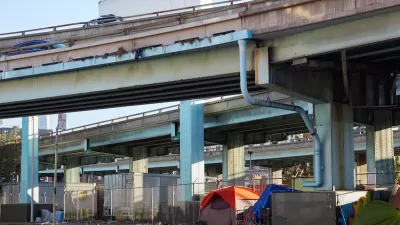An analysis from Denver shows that unhoused people receiving services based on a Housing First approach were more likely to access psychiatric care and had fewer emergency medical visits.

An analysis of supportive housing programs in Denver, Colorado reveals that a Housing First approach, which prioritizes placing unhoused people into housing before imposing other requirements, led to higher rates of doctor visits for mental health diagnoses and prescriptions and lower numbers of emergency room visits among participants.
An article by researchers Devlin Hanson and Sarah Gillespie in Health Affairs outlines part of their results. “Two years after assignment to the Housing First intervention, participants had an average of eight more office-based visits for psychiatric diagnoses, three more prescription medications, and six fewer emergency department visits than the control group.” The two groups had no statistically significant difference in mortality rates.
The authors see these results as an indicator that housing programs can also impact health care provision. “As policy makers seek increased funding to scale up effective ways to address the needs of populations experiencing chronic homelessness, our results provide evidence that supportive housing with a Housing First approach not only can provide a housing solution but also can facilitate engagement in needed health care services.”
FULL STORY: ‘Housing First’ Increased Psychiatric Care Office Visits And Prescriptions While Reducing Emergency Visits

Alabama: Trump Terminates Settlements for Black Communities Harmed By Raw Sewage
Trump deemed the landmark civil rights agreement “illegal DEI and environmental justice policy.”

Planetizen Federal Action Tracker
A weekly monitor of how Trump’s orders and actions are impacting planners and planning in America.

The 120 Year Old Tiny Home Villages That Sheltered San Francisco’s Earthquake Refugees
More than a century ago, San Francisco mobilized to house thousands of residents displaced by the 1906 earthquake. Could their strategy offer a model for the present?

In Both Crashes and Crime, Public Transportation is Far Safer than Driving
Contrary to popular assumptions, public transportation has far lower crash and crime rates than automobile travel. For safer communities, improve and encourage transit travel.

Report: Zoning Reforms Should Complement Nashville’s Ambitious Transit Plan
Without reform, restrictive zoning codes will limit the impact of the city’s planned transit expansion and could exclude some of the residents who depend on transit the most.

Judge Orders Release of Frozen IRA, IIJA Funding
The decision is a victory for environmental groups who charged that freezing funds for critical infrastructure and disaster response programs caused “real and irreparable harm” to communities.
Urban Design for Planners 1: Software Tools
This six-course series explores essential urban design concepts using open source software and equips planners with the tools they need to participate fully in the urban design process.
Planning for Universal Design
Learn the tools for implementing Universal Design in planning regulations.
Clanton & Associates, Inc.
Jessamine County Fiscal Court
Institute for Housing and Urban Development Studies (IHS)
City of Grandview
Harvard GSD Executive Education
Toledo-Lucas County Plan Commissions
Salt Lake City
NYU Wagner Graduate School of Public Service





























